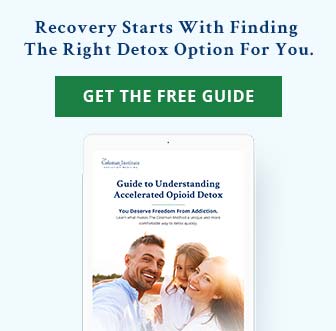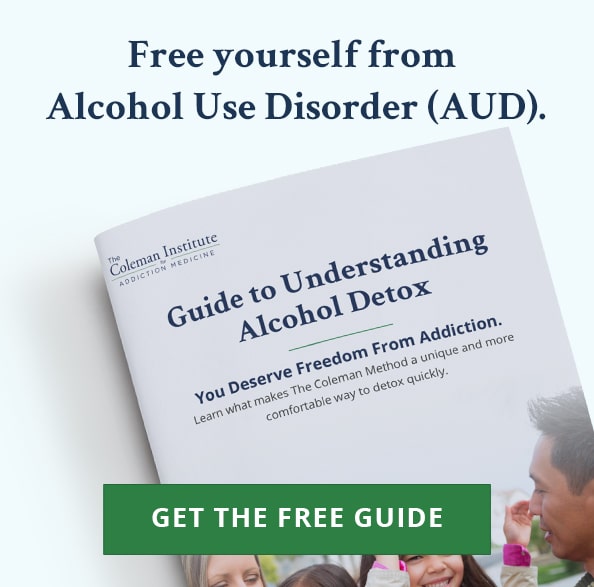The Coleman Institute for Addiction Medicine Blog
28
Jan 26
Does the Military Test for Kratom?
Kratom use in the United States military has shifted from a gray area to a growing concern. While kratom is often marketed as a legal supplement, recent actions by the Department of Defense and individual service branches make it clear that kratom use is prohibited in military service and subject to enforcement.
For service members, the real question is no longer just whether kratom appears on a routine drug test, but whether continued use, and how someone chooses to stop, could affect their life, including their health and career.
The Military is Paying Closer Attention to Kratom
Recently, the Department of Defense has taken a stronger stance on substances that may impair readiness, judgment, or health, even if those substances are not federally scheduled drugs.In September 2025, the Defense Department declared kratom use a violation of the Uniform Code of Military Justice (UCMJ), enforceable under Article 92, effective December 31st.
Individual branches have reinforced this position through official communications.
- The Navy and Marines issued an All Navy Message (ALNAV 003/26) prohibiting kratom and kratom-derived compounds, citing health risks, potency concerns, and the unregulated nature of modern kratom products.
- The Air Force has made a public warning to service members that kratom is on the DoD’s prohibited substance list.
- The Army Criminal Investigation Command has warned that kratom use may result in serious consequences under the UCMJ as well.
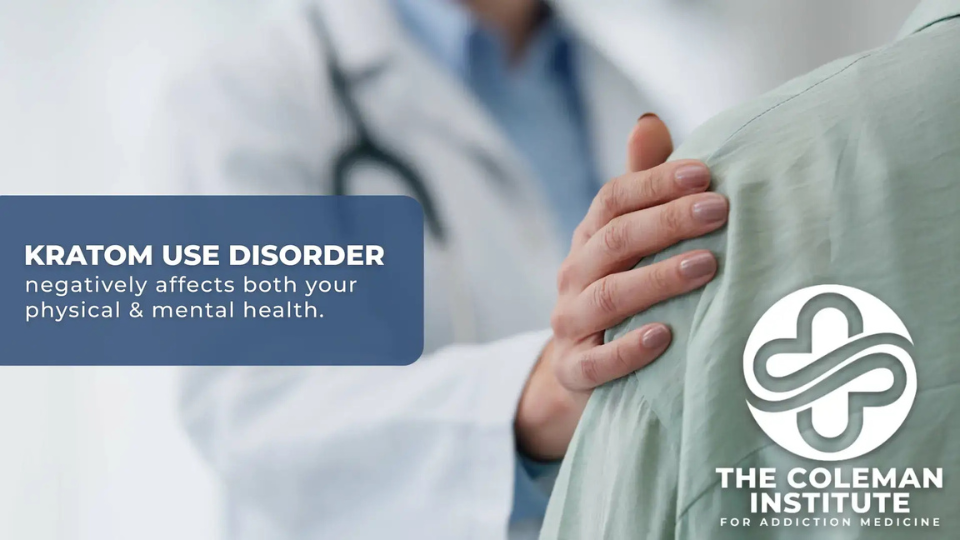
What Kratom Products Did The Military Ban?
Use of any substance derived from kratom is not allowed in the U.S. military.The military’s scrutiny includes kratom’s active compounds, such as Mitragynine and 7-hydroxymitragynine (7-OH). The ban includes all forms, including naturally derived, semi-synthetic, and fully synthetic forms.
Many modern kratom products are no longer simply leaves or powder. Selections range from gummies, vapes, capsules, and more. They are often sold as enhanced or concentrated formulas, including nano kratom and psuedoinoxyl.
Some of these products contain highly concentrated 7-OH, which the military has specifically flagged as especially potent and risky.
Can the Military Test for Kratom?
Yes, the military can test for kratom.While kratom may not appear on every standard drug test panel, specialized laboratory testing can detect kratom alkaloids when testing is ordered.
The idea that ‘kratom is safe because it isn’t tested for’ is a very risky assumption, especially as the military tightens oversight of substances it considers a threat.
The Issue for Kratom Users in the Military
For many service members, kratom use begins as a way to cope with pain, stress, fatigue, or trauma, and gradually becomes part of a daily routine.With regular use, individuals may experience physical and/or psychological dependence, withdrawal symptoms, or escalation to more potent forms of kratom due to an increased tolerance.
Kratom use now carries severe risks within the military due to the military's crackdown on mind-altering substances.
Treatment Approach Matters in the Military
Choosing a treatment approach is where many service members encounter an unexpected issue.Many treatment programs respond to kratom dependence by transitioning patients onto opioid replacement medications, such as Suboxone or methadone. But at the end of the day, those drugs are still opioids.
Service members generally cannot continue serving while prescribed opioid-based maintenance medications. Being placed on these medications may lead to duty restrictions, medical disqualification, or administrative separation. For military personnel, swapping kratom for an opioid-based medication may stop kratom use, but it can also create a new barrier to continuing service.
The Coleman Institute for Addiction Medicine uses an abstinence-based approach with non-addictive comfort medications. Our approach ensures that you’re not swapping one addiction for another.
Seek Help and Begin Recovery
Across military guidance, one message is consistent: early intervention and action are encouraged.Seeking help before enforcement, testing, or disciplinary action protects your health, reduces career and legal risks, allows you to enter treatment on your own terms, and prevents your kratom use from continuing to spiral out of control.
For many service members, the challenge isn’t deciding to stop kratom but finding a way to stop that aligns with military expectations.
The Coleman Institute’s kratom detox can be completed in just 5 days, whereas other treatment facilities will typically require you to be admitted inpatient for a minimum of thirty days; when you’re serving the military, most aren’t able to step away from their everyday life for a whole month.
Kratom Detox at The Coleman Institute
For individuals seeking a fast, effective, and safe treatment option, The Coleman Institute offers a medically supervised, abstinence-based, 5-day outpatient kratom detox program.Unlike many programs, The Coleman Institute does not use any opioid replacement medications such as Suboxone or methadone. Instead, we focus on using non-addictive comfort medications and providing an outpatient structure that allows for flexibility.
Our approach allows individuals to quit kratom without substituting another medication that could interfere with their ability to serve. Following detox, we offer Naltrexone Therapy to help with cravings and prevent relapse. Naltrexone and its extended form, Vivitrol, are opioid antagonists and do not show up on urine drug screens, unlike Suboxone.
If you or a loved one needs to stop using kratom products, we’re here to help. Call us now to take the first step toward lasting recovery.
20
Nov 25
What is Nano Kratom? – Accelerated Outpatient Detox for Kratom
Nano kratom has emerged as one of the latest forms of kratom on the market. This reformulated powder is promoted as a ‘more advanced’ version of traditional kratom, created using nanotechnology to increase absorption and deliver a faster onset of more intense effects.
Faster absorption means nano kratom can feel stronger and act more quickly than traditional kratom, but wears off sooner. Over time, its intensity can heighten the risk of opioid-like physical withdrawal or Kratom Use Disorder (KUD).
At The Coleman Institute for Addiction Medicine, we’ve seen a growing number of our patients struggling with dependence and withdrawal from concentrated kratom formulations, including nano kratom. Understanding how these reformulated products affect your or your loved one's brain is key to finding the best path to recovery.
How Does Nano Kratom Work?
Nano kratom is not a new strain or chemical compound; it’s a reformulated version of standard kratom powder that’s been processed into extremely small particles, often less than 100 nanometers in diameter. This increased absorption via nanotechnology enhances how the body absorbs kratom’s active alkaloids, mitragynine and 7-hydroxymitragynine.
While this process doesn’t change kratom’s chemistry, it alters how quickly the body responds. Faster absorption can make the effects feel stronger, increasing the likelihood of tolerance and dependence.
Kratom’s alkaloids, especially 7-hydroxymitragynine (7-OH), bind to opioid receptors in the brain, explaining the physical withdrawal symptoms many people experience after regular use.
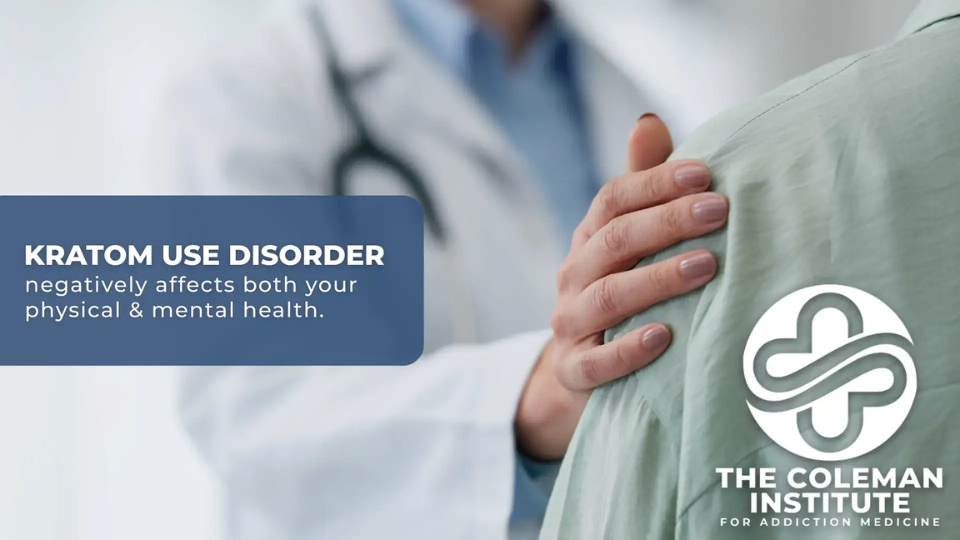
Why Nano & Other Enhanced Kratom Products Are Riskier
These ‘ultra-enhanced’ nano kratom formulations deliver higher concentrations of kratom alkaloids than natural leaf powder. Because these forms are absorbed more efficiently, they act more strongly on the brain’s mu-opioid receptors, increasing the risk of dependence and withdrawal.
Other emerging derivatives, such as pseudoindoxyl (pseudo), may be even more potent due to their altered chemical structure. These synthetic variants can be especially difficult to stop using because of their strong opioid-like effects and prolonged activity in the body.
Although some manufacturers market nano kratom as a ‘cleaner high’ or ‘more effective’, what they’re really describing is its increased potency, and that also means increased risk. Because long-term safety data on nano-processed kratom is extremely limited, medically monitored detox remains the safest and most reliable option for stopping use.
Common Nano Kratom Withdrawal Symptoms
Withdrawal from nano kratom can vary depending on dose, frequency, and individual factors, but commonly includes:
- Intense cravings
- Anxiety & restlessness
- Muscle aches & body pain
- Fatigue or insomnia
- Irritability or mood swings
- Sweating & chills
- Nausea, vomiting, or diarrhea
- Runny nose & watery eyes
Because of its enhanced absorption and shorter high, nano kratom may cause stronger or faster-onset withdrawal than other standard kratom products.
Our Abstinence-Based Approach to Treatment
At The Coleman Institute, we use an abstinence-based approach to help people safely stop using kratom, including nano kratom, without relying on replacement medications like methadone or Suboxone.
The Coleman Institute’s Outpatient Kratom Detox program makes detox quicker, safer, more comfortable, and effective through the use of non-addictive comfort medications that ease withdrawal symptoms. Using our Accelerated Opioid Detox protocols, patients can complete detox in as few as five days, without the need for inpatient hospitalization.
This approach allows patients to begin recovery completely free from kratom and opioid-replacement therapies, establishing a solid foundation for long-term recovery.
Nano Kratom Myths versus Facts
| Myth | Fact |
| “Nano kratom is not addictive.” | Just like regular kratom, nano kratom is addictive. Kratom’s alkaloids activate the same brain receptors as opioids, which can cause physical dependence and withdrawal. |
| “Kratom products help people detox from opioids naturally.” | While some use kratom to manage opioid withdrawal, it usually leads to cross-dependence that requires medical detox. |
| “You don’t need medical help to stop using kratom products.” | Withdrawal can be extremely uncomfortable and destabilizing; professional medical detox services ensure safety and comfort. |
The Dangers of Detoxing Cold Turkey
Even though kratom is legal in many states, that doesn’t mean it’s safe to quit without help. Sudden discontinuation, especially from more potent forms like nano kratom, can cause significant withdrawal symptoms that increase the risk of relapse.
A supervised medical detox program provides structure, comfort, and accountability, helping patients begin recovery with professional clinical support.
Nationwide Outpatient Kratom Detox Locations
The Coleman Institute provides Accelerated Outpatient Detox programs at convenient locations across the United States, including:
Our experienced team of professionals has helped thousands of patients across the country safely detox from kratom and other addictive substances through compassionate, evidence-based care.
Break Free From Kratom Withdrawal Today
If you or someone you love is struggling with kratom products, you don’t have to face this alone. Call 888-705-9615 or schedule a callback to start your recovery journey from kratom today.
9
Oct 25
How to Detox Without Inpatient Rehab – Outpatient Detox
Medically Supervised Outpatient Accelerated Detox
Many people hesitate to break free from addiction because they fear detox. They picture long inpatient rehab stays or hospitalization, being forced to share a patient room with other people, painful withdrawal, and time away from work and loved ones. Others attempt to stop using on their own, hoping to ‘tough it out’.Detoxing without medical support is not safe. Withdrawal from substances such as opioids and alcohol can lead to severe physical and psychological complications, including seizures, dehydration, and relapse.
At The Coleman Institute for Addiction Medicine, we offer a safer alternative: Accelerated Outpatient Detox. Our one-of-a-kind program helps patients detox from addictive substances in as little as three days, without hospitalization or general anesthesia, and always under expert, licensed medical supervision.
Detoxing Without Medical Support Is Dangerous
Attempting to quit cold turkey or detoxing at home can result in dangerous, challenging, and extremely uncomfortable withdrawal symptoms that are detrimental to your health.These symptoms may include:
- Severe vomiting, diarrhea, and dehydration
- Uncontrolled anxiety, tremors, or agitation
- Heart irregularities or seizures
- Delirium tremens (for alcohol withdrawal)
- Depression or suicidal thoughts
- A higher risk of relapse and overdose
A Better Alternative to Inpatient Detox
Traditional hospital-based detox programs can last several weeks and often use replacement opioids such as methadone or Suboxone. These programs can be costly, disruptive to daily life, and difficult to complete.The Coleman Institute’s outpatient detox programs provide a medically supervised yet flexible alternative with non-addictive comfort medications. Patients have their own private room during the day at the facility and return to their home or lodging each night, avoiding the disruption of inpatient rehab while still receiving clinically excellent care.
With over 25 years of experience and a 95% completion rate, The Coleman Method is among the most trusted outpatient detox options available today.
How The Coleman Method Works
- Pre-Detox Evaluation A licensed medical provider reviews your history and develops a personalized treatment plan with you. You’ll receive clear instructions before starting, including when to stop using substances before treatment begins.
- Day One Patients arrive in mild withdrawal. Our team conducts a comprehensive medical assessment. Comfort medications and micro-doses of naltrexone for opioid detoxes, or Phenobarbital for alcohol detoxes, begin to be used.
- Day Two & Beyond Withdrawal symptoms are carefully managed, and you meet with a compassionate case manager. Medications are adjusted as needed throughout the detox.
- Final Day A comprehensive treatment plan for long-term sobriety and plans for follow-up medical care are established. Long-acting naltrexone (Vivitrol) can be administered to support ongoing recovery.
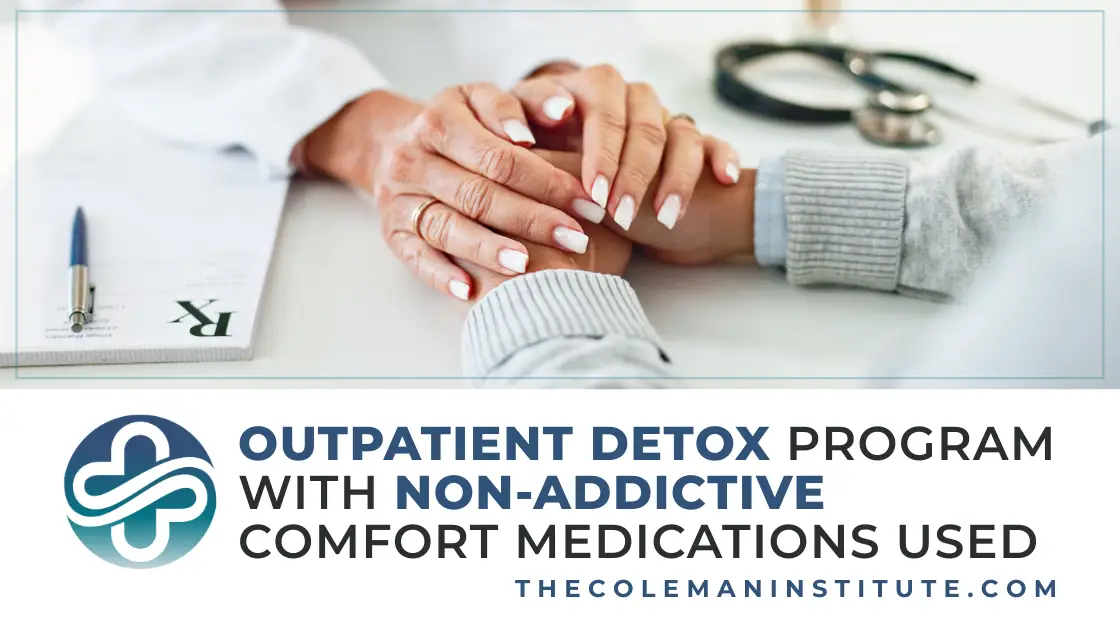
Outpatient Detox Programs at The Coleman Institute
Our accelerated detox method supports individuals detoxing from a wide range of substances. Each program is fully outpatient, medically supervised, and abstinence-based.The Coleman Institute for Addiction Medicine offers:
- Opioid Detox - for heroin, fentanyl, prescription painkillers, and more
- Alcohol Detox - medically monitored to prevent withdrawal complications
- Suboxone Detox - to safely transition off maintenance therapy
- Methadone Detox - a structured approach for long-term users
- Kratom Detox - for individuals dependent on kratom products
- Stimulant Detox - for cocaine, methamphetamine, and more
- Benzodiazepine Detox - for Xanax, Valium, Klonopin, and more
Why Choose The Coleman Institute
You won’t find The Coleman Institute’s unique, effective approach anywhere else in the United States.The benefits of our program include:
- Detox completed in as few as three days
- No hospitalization or anesthesia required
- Non-addictive comfort medications to minimize withdrawal
- Naltrexone Therapy (Vivitrol) to prevent relapse
- Six months of follow-up care and case management
- Abstinence-based, no methadone or Suboxone maintenance
- 25+ years of experience and 95% completion rate
Continuing Care After Completing Detox
Detox is only the beginning of recovery. Every patient receives personalized case management for up to six months after completing detox.Our case managers help coordinate ongoing support, such as:
- Individual Therapy
- Support Groups
- Family Counseling
- Partial Hospitalization Program (PHP)
- Intensive Outpatient Program (IOP)
- Outpatient Program (OP)
- Sober Living Housing
- Ongoing Naltrexone Therapy
The Coleman Institute’s Locations
The Coleman Institute for Addiction Medicine is available in five U.S. states.We have facilities nationwide, including:
- Richmond, Virginia (Headquarters)
- Denver, Colorado
- Tampa, Florida
- Atlanta, Georgia
- Orange County, California
The Best Way to Detox Without Going Inpatient
Detoxing alone is unsafe, but detoxing without going inpatient can be safe when performed under medical supervision at The Coleman Institute.Thousands of patients throughout the country have completed detox safely through our Accelerated Outpatient Detox programs. With expert clinical oversight, effective medical protocols, and compassionate care, we help patients take their first step toward lasting recovery safely, comfortably, and without the need for inpatient hospitalization.
Start your recovery today! Call 877-773-3869 or schedule a callback to learn more about our Outpatient Accelerated Detox programs.
26
Sep 25
Pseudoindoxyl (Pseudo) Withdrawal – Outpatient Kratom Detox
What Is Pseudoindoxyl (Pseudo)?
Mitragynine Pseudoindoxyl (also known as Pseudo or MP) is one of the most powerful compounds linked to kratom and its opioid-like effects. It is created when 7-hydroxymitragynine (7-OH), one of kratom’s strongest active ingredients, is rearranged into an even more potent form.Certain kratom products are now marketed as containing concentrated 7-OH and Pseudo, usually in tablet or liquid forms. Kratom and its enhanced versions act much more like traditional opioids. People who use them often find themselves developing dependence quickly and experiencing withdrawal symptoms as severe as quitting fentanyl or other opioids.
For individuals using Pseudo products, and for loved ones watching their struggles unfold, understanding what makes these products so dangerous is the first step toward finding and getting help.
How Pseudo Is Different From Regular Kratom
Standard kratom leaves mostly contain mitragynine, the plant’s primary compound. Mitragynine can create dependence over time and can lead to Kratom Use Disorder (KUD).Pseudo and other 7-OH enriched products are in a different category than typical kratom, especially when the two are mixed. 7-OH, 7-Hydroxy, or 7-Hydroxymitragynine, is an even more potent opioid-like compound that is present in small amounts naturally but often concentrated in extracts. Pseudo, MP, or Mitragynine Pseudoindoxyl is a rearrangement product of 7-OH that is formulated to be even stronger, now appearing in some marketed kratom products in stores as well as online.
These factors make Pseudo potentially even more addictive and more difficult to stop using, especially alongside 7-OH. Many people don’t even realize they’ve moved from standard kratom into using synthetic products that are even more potent.
What Pseudo Withdrawal Feels Like
Because Pseudo acts like a strong opioid, withdrawal symptoms often mirror opioid withdrawal.Physical symptoms:
- Severe muscle & bone pain
- Nausea, vomiting, & diarrhea
- Restlessness & fatigue
- Sweating, chills, & goosebumps
- Increased heart rate or blood pressure
- Overwhelming cravings
- Anxiety or panic attacks
- Depression & hopelessness
- Irritability & agitation
- Difficulty sleeping
Why Quitting Alone Is Dangerous
A common myth is that kratom is easy to quit. It’s not, especially when you’re using an enhanced version. Because of how it taps into the same receptors in the brain as opioids do, stopping suddenly without medical help often leads to:- Intense withdrawal symptoms
- Higher risk of relapse
- Increased overdose risk
Outpatient Detox for Pseudo Withdrawal
The Coleman Institute for Addiction Medicine has been saving lives for over 25 years, and we’ve been helping people detox from kratom since 2018. Our Kratom Detox program safely manages withdrawal while allowing patients to return home each day. This makes recovery more accessible for people who can’t put their lives completely on hold or afford to stay in a 30-day residential rehab.Our Kratom Detox Approach:
- Short Treatment Timeline - Most detoxes are completed in just a few days instead of having to face withdrawals for weeks.
- Comfort-Focused Care - We use non addictive medications to help reduce withdrawal symptoms and cravings.
- No Hospitalization Needed - Our process is safe and outpatient-based with no inpatient stay required.
- Relapse Prevention - Many patients opt for Naltrexone Therapy to reduce cravings and protect against relapse.

The Coleman Institute is Here to Help
If you or a loved one is abusing kratom products, you may notice mood swings, anxiety, or repeated failed attempts to quit. It can be confusing and painful (mentally and physically), especially as these products are sold legally and often marketed as ‘safe’.But Mitragynine Pseudoindoxyl is not harmless. It acts like an opioid, and withdrawal can be extremely challenging. The good news is that with professional help, recovery is possible. Many people who once felt trapped by kratom addiction have broken free and started a new chapter in life.
Find Help for Pseudo Withdrawal
At our Virginia headquarters, The Coleman Institute accepts Anthem Blue Cross Blue Shield and Sentara Health Plans, along with self-pay and financing options. We also provide treatment in Colorado, Florida, Georgia, and California.Call us today at 540-253-1029 or schedule a callback to learn more about outpatient detox for Pseudo withdrawal. Whether you’re struggling yourself or supporting someone you love, you don’t have to face addiction alone.
13
Aug 25
Isotonitazene (ISO) – Accelerated Outpatient Opioid Detox
Isotonitazene, often referred to as 'ISO', belongs to the nitazene class of opioids, a group of synthetic drugs that can be multiple times stronger than morphine and significantly more potent than fentanyl.
Since its emergence in the U.S. illicit drug supply in 2019, ISO has been linked to an alarming number of medical emergencies and overdoses. Part of what makes it so dangerous is how it can go under the radar; it's often mixed into counterfeit pills or street drugs without the user knowing. Even experienced opioid users may not realize they've taken it until it's too late.
At The Coleman Institute for Addiction Medicine, we know how urgent it is to act when dealing with substances such as Isotonitazene. Our Accelerated Outpatient Opioid Detox program can help you safely and comfortably eliminate opioids from your system in days without the need for hospitalization.
What Is Isotonitazene?
Originally synthesized for pharmaceutical research but never approved for medical use, Isotonitazene acts on the opioid receptors in the brain. Additionally, these are the same receptors activated by heroin, oxycodone, and fentanyl; ISO binds to those receptors, despite being synthetic.Why Is It Dangerous?
- Extreme potency: Even tiny amounts can suppress breathing, cause unconsciousness, or lead to death.
- Unpredictable risk: Since ISO is often combined with other substances, people may unknowingly ingest dangerous doses.
- Difficult detection: Standard drug tests may not pick it up, delaying critical care in overdose situations.
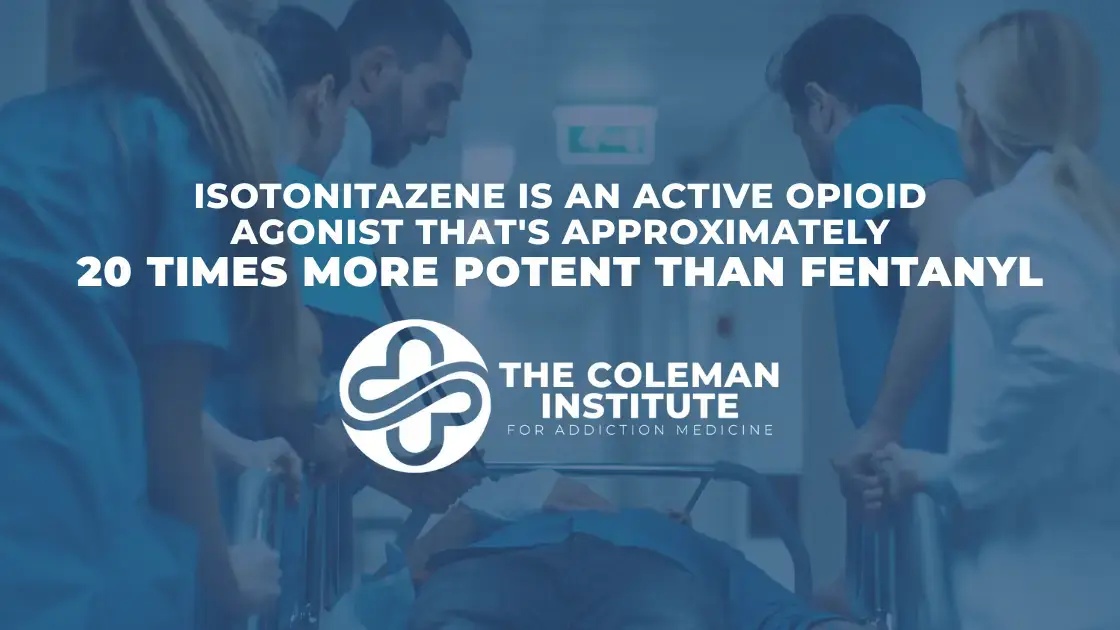
Why Quitting ISO Is Difficult
Because Isotonitazene is so potent, the body quickly becomes dependent. Stopping cold turkey can trigger severe withdrawals.Signs & Symptoms May Include:
- Muscle aches & body pain
- Intense cravings
- Restlessness & insomnia
- Nausea, vomiting, & diarrhea
- Anxiety, irritability, & depression
- Sweats, chills, & flu-like symptoms
How Accelerated Outpatient Detox Works
Traditional detox programs may require weeks in a hospital or inpatient facility. Our Accelerated Outpatient Opioid Detox is different; it's faster, more comfortable, and helps you recover without putting your life completely on hold.Our Treatment Program Includes:
- Comprehensive Assessment: We evaluate your health, history, and usage to create a personalized treatment plan.
- Medically Supervised Detox: Over a few days, we gradually and safely remove opioids from your brain's receptors, reducing the intensity of withdrawal.
- Non-Addictive Medications: We use medications that control cravings and discomfort without creating new dependence.
- Relapse Prevention: Once the opioids have been flushed out of the system, we can start Naltrexone Therapy with Vivitrol injections, which block opioid effects and reduce the risk of relapse.
- Case Management: You'll have access to support during and post-detox, including follow-ups with your medical provider and referrals to continue addiction treatment (PHP, IOP, etc).
The Importance of Naltrexone Therapy
Detox is the first step, but we believe relapse prevention is critical for lasting recovery. Naltrexone works by binding to opioid receptors and blocking the effects of opioids if they are used again. Meaning that even if a slip occurs, the user won't experience the euphoric high that fuels the cycle of addiction.By incorporating Naltrexone after detox, we help patients:
- Reduces opioid cravings
- Supports early recovery
- Lowers relapse risk
Why People Choose The Coleman Institute
- Faster Detox: Complete the detoxification process in days, not weeks.
- Outpatient Convenience: Return home or to a supportive environment each night.
- Comfort-Focused Care: Minimize withdrawal symptoms in a safe, supportive environment.
- Proven Success: Over 25 years of experience with a 95% completion rate and thousands of patients helped across the country.
- Naltrexone Therapy: Transition into Naltrexone Therapy for long-term sobriety right after detox.
- Nationwide Access: Locations available in multiple states with our detox protocol.
Insurance & Payment Options
Our philosophy is that life-saving addiction treatment should be accessible.At Our Richmond, VA Facility, We:
- Accept Insurance
- Anthem Blue Cross Blue Shield
- Sentara Health Plans
- Accept third-party financing
- Offer self-pay rates
The Coleman Institute’s Locations
The Coleman Institute offers Accelerated Outpatient Opioid Detox at:The Risk of Waiting to Stop
Every day with Isotonitazene use is a gamble. However, because it's so potent and often hidden within other drugs, the risk of fatality is high, even for people with high opioid tolerance. The sooner you stop, the sooner you can protect yourself from becoming another statistic.Choose Recovery Today
Recovery is possible, and it can start now. The Coleman Institute's Accelerated Outpatient Opioid Detox offers a safe, fast, and comfortable way to break free from Isotonitazene and start a new, healthier, happier chapter in life.Call us at 877-773-3869 to speak with a recovery expert. We'll answer your questions, verify your insurance, and help you take the next step toward a brighter future.






